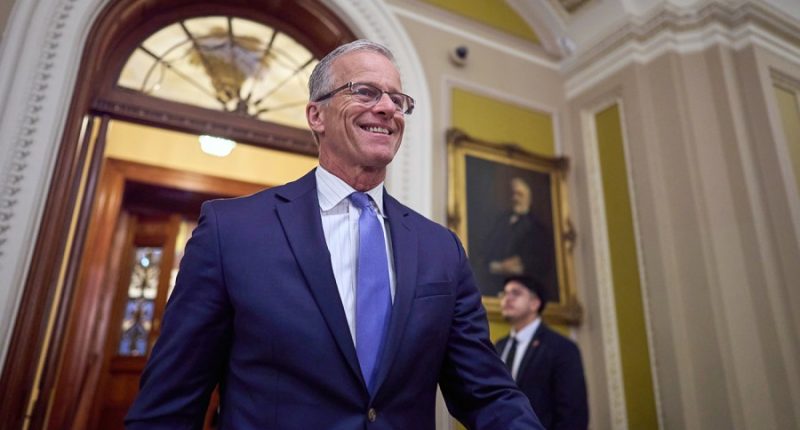Share this @internewscast.com

On Saturday, Senate Republicans narrowly voted to move forward with a comprehensive 1,000-page bill aimed at implementing President Trump’s agenda, despite dissent from two GOP senators.
The vote was 51-49.
Sen. Rand Paul (R-Ky.) and Sen. Thom Tillis (R-N.C.) were the two Republicans who opposed advancing the package. Sen. Paul is against a provision that would increase the debt limit by $5 trillion, while Sen. Tillis is concerned that the legislation would reduce federal Medicaid funding for his state by $38.9 trillion.
Sen. Ron Johnson (R-Wis.) switched his vote from “no” to “aye,” and hesitant Senators Mike Lee (R-Utah), Rick Scott (R-Fla.), and Cynthia Lummis (R-Wyo.) also supported advancing the bill.
The bill had suffered several significant setbacks in the days and hours before coming to the floor, at times appearing to be on shaky ground.
The vote itself was also full of drama.
Signs of trouble started to pop up 50 minutes after the vote opened when three GOP senators who had expressed misgivings about the bill — Sens. Lisa Murkowski (R-Alaska), Lee and Scott — still hadn’t showed up on the Senate floor.
Three other Republican senators, Sens. Rand Paul (R-Ky.), Thom Tillis (R-N.C.) and Johnson, announced well in advance of the vote that they would oppose the motion to proceed and could not support the bill in its current form.
Senate Majority Leader John Thune (R-S.D.) stood along the back wall of the chamber — appearing somewhat nervous — waiting for his missing colleagues to arrive on the floor.
Thune was surrounded by members of his leadership team, including Senate GOP Whip John Barrasso (R-Wyo.), Sen. Markwayne Mullin (R-Okla.), the deputy whip, and Senate Budget Committee Chairman Lindsey Graham (R-S.C.), as he shifted his weight from foot to foot.
When Murkowski finally appeared on the floor, she was quickly surrounded by Thune, Barrasso, Graham and Senate Finance Committee Chairman Mike Crapo (R-Idaho), who barraged her on all sides with points and interjections.
Then Murkowski walked away from the leadership group and sat down next to Senate Health, Education, Labor and Pensions Committee Chairman Bill Cassidy (R-La.) to have a quiet tête-à-tête.
Murkowski eventually voted in favor of advancing the measure, but the vote remained open.
Almost three hours after the vote began, Johnson, Lee, Scott and Lummis walked out of Thune’s office with Vice President Vance and headed to the Senate floor to cast the final votes to advance the bill.
Earlier in the week, perhaps the most notable setback was a ruling by the Senate parliamentarian that a cap on health care provider taxes, which is projected to save billions of dollars in federal Medicaid spending, violated the Senate’s Byrd Rule. GOP leaders were able to rewrite that provision for it to remain in the bill.
And the legislation appeared in danger moments before vote, when Sen. Tim Sheehy, a freshman Republican from Montana, threatened to vote against the motion to proceed if the bill included a provision championed by Sen. Mike Lee (R-Utah) directing the Interior Department to sell millions of acres of public lands.
Sheehy agreed at the last minute to vote for the legislation after GOP leaders promised he would get a vote on an amendment to strip the language forcing the sale of public lands from the bill.
In the end, Thune pulled off a major victory by moving the legislation a big step closer to final passage.
Thune hailed the legislation Saturday as a “once-in-a-generation opportunity to deliver legislation to create a safer, stronger and more prosperous America.”
He cited $160 billion to secure the borders and beef up immigration enforcement and $150 billion to increase the Pentagon’s budget, as well as an array of new tax cuts in addition to the extension of Trump’s expiring 2017 tax cuts.
He pointed to the bill’s elimination of taxes on tips and taxes on overtime pay for hourly workers, as well as language allowing people to deduct auto loan interest when they buy a new car made in the United States.
President Trump has set a July 4 deadline for Congress to get the bill to his desk.
Senate Democratic Leader Chuck Schumer (N.Y.) blasted his Republican colleagues for unveiling the 940-page Senate substitute amendment late Friday night, giving senators only a few hours to review the legislation before the vote.
“Hard to believe, this bill is worse, even worse than any draft we’ve seen thus far. It’s worse on health care. It’s worse on [the Supplemental Nutrition Assistance Program.] It’s worse on the deficit,” he said.
Schumer slammed Republicans for advancing the bill before having an official budgetary estimate from the Congressional Budget Office.
“They’re afraid to show how badly this will increase the deficit,” he said. “Future generations will be saddled with trillions in debt.”
A preliminary analysis by the Congressional Budget Office circulated by Senate Finance Committee Democrats Saturday estimates the bill will cut Medicaid by $930 billion, far more substantially than the legislation passed last month by the House.
Tillis cited the impact on Medicaid as the reason he voted “no” on the motion to proceed, and plans to vote “no” on final passage.
“I cannot support this bill in its current form. It would result in tens of billions of dollars in lost funding for North Carolina, including our hospitals and rural communities,” he said in a statement.
“This will force the state to make painful decisions like eliminating Medicaid coverage for hundreds of thousands in the expansion population, and even reducing critical services for those in the traditional Medicaid population,” he warned.
Sen. Susan Collins (R-Maine), a critical swing vote, said she voted to advance the legislation out of “deference” to the GOP leader but warned that doesn’t mean she will vote “yes” on final passage.
She said that Senate negotiators improved the legislation before releasing it Friday but added that she wants to make additional changes.
“Generally, I give deference to the majority leader’s power to bring bills to the Senate floor. Does not in any way predict how I’m going to vote on final passage,” Collins told reporters.
“That’s going to depend on whether the bill is substantially changed,” she said. “There are some very good changes that have been made in the latest version but I want to see further changes and I will be filing a number of amendments.”
Former senior White House adviser Elon Musk blasted the Senate bill on social media shortly before the vote, calling it full of “handouts to industries of the past,” referring to the oil, gas and coal industries.
“The latest Senate draft bill will destroy millions of jobs in America and cause immense strategic harm to our country! Utterly insane and destructive. It gives handouts to industries of the past while severely damaging industries of the future,” he wrote on X, the social media platform he owns.
Schumer told Democratic senators before the vote that he would force the clerks to read the entire 1,000-page bill on the Senate floor, which is estimated to take up to 12 hours and delay the start of debate and the start of a marathon series of amendment votes, known as a vote-a-rama.
It’s unclear whether Republican senators will keep the Senate in session overnight Saturday into Sunday morning to have the bill read aloud on the floor, an exhausting process for the Senate floor staff.
An overnight reading of the bill would leave the clerks and floor staff weary before senators are scheduled to hold 20 hours of debate on the legislation and then launch into a multihour vote-a-rama.
















